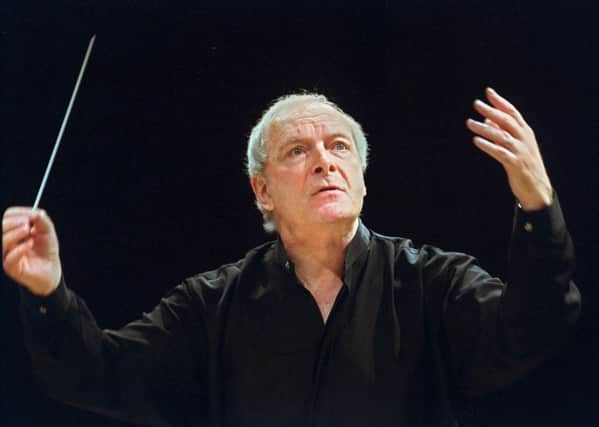Obituary: Christopher Hogwood CBE, conductor


Christopher Hogwood was an inspiring conductor and keyboard player whose knowledge of early music was encyclopaedic. He radically changed the way Baroque music was played. His orchestra, the Academy of Ancient Music, performed worldwide, recorded and was instrumental in establishing the art of period instrument playing.
His aim was to perform baroque and classical music in the style and spirit in which it was originally heard in the 17th and 18th centuries. Not for nothing did he become known as “the Herbert von Karajan of early music”.
Advertisement
Hide AdAdvertisement
Hide AdHis recordings are legendary: there was a clarity and energy about them that made a Hogwood disc special. His classic 1980 recording of Handel’s Messiah was revolutionary in its day and is still in the catalogue.
His later recordings of all the Mozart symphonies made musicians reassess the playing of the classics and the way the instruments required to be played.
By 1983 Hogwood was one of the best-selling classical recording artists, alongside von Karajan and Luciano Pavarotti.
Christopher Jarvis Haley Hogwood was the eldest of five children. His father was a scientist and his mother a legal secretary. He attended Nottingham High School and The Skinners’ School, Tunbridge Wells, taking piano lessons but showing no special interest or ability. He read Classics and Music at Pembroke College, Cambridge, where his interest in music was really founded. He spent a summer in Prague on a British Council scholarship studying the harpsichord.
Back in the UK, Hogwood worked with the Early Music Consort before studying the keyboard further in Amsterdam. He returned to Britain and played continuo for Neville Marriner’s Academy of St Martin in the Fields. In 1973 he created the Academy of Ancient Music: his flair and desire to explore Baroque music caught on immediately. Recording contracts flooded in and the orchestra was invited to the Proms in the mid-Seventies.
It was in 1979 that Hogwood and the orchestra first appeared at the Edinburgh Festival. In the Queen’s Hall they gave a concert of Mozart and that was followed in 1990 with music by Bach and Handel. The following year they performed a Vivaldi concert in the Usher Hall with the counter-tenor James Bowman as soloist.
In 1996 Hogwood conducted a fine performance (“a gorgeous tableau” wrote The Scotsman critic) of Gluck’s Orfeo ed Euridice in the Festival Theatre with a cast led by Michael Chance. The Mark Morris Dance Group combined with Hogwood’s own Boston’s Handel Society to breathe fresh life into the masterpiece. Hogwood, the critic wrote, “was the soul of discreet good taste”.
Hogwood was scheduled to make his debut with the Scottish Chamber Orchestra conducting Haydn’s Creation in May next year. He had the knack of marketing many of his recordings or concerts with an eye-catching title. There was Music from the Armada Years, Venice Preserv’d and he enticed Joan Sutherland to record Handel’s Athalia and Cecilia Bartoli to record Handel’s Rinaldo.
Advertisement
Hide AdAdvertisement
Hide AdIn 2006 Hogwood was succeeded at the Academy of Ancient Music by Richard Egarr and Hogwood furthered his close association with the Boston Society. He was appointed professor of music at Gresham College, taught and gave much-prized lectures.
His recordings have become a benchmark by which other period instrument orchestras are judged. It was Hogwood’s intense scholarship and understanding of the music that allowed him to bring a fresh and brilliant approach to a score.
The 1980 Messiah, for example, reconstructed the performance Handel himself gave at the Foundling Hospital in London in 1754. The dignity that he brought to the music of JS Bach, especially the Brandenburg Concertos, is timeless.
His musical life was, however, not rooted in Baroque music. He had a passion for the 19th (especially Mendelssohn) and the 20th centuries conducting works by Tippett, Martinu and Britten.
Hogwood was a born enthusiast with a dignified presence on the podium. His cheerful and welcoming smile put musicians at ease in rehearsal and audiences warmed to his relaxed and gracious personality.
His principal home was in Cambridge, where he was an avid collector of scores, English porcelain, musical manuscripts and books – especially recipe books. Indeed, so large was the collection Hogwood bought the house next door.
He also had homes in Tuscany and the South of France.
He was an inspirational figure in the world of music. When he founded the Academy of Ancient Music, many considered his championing of Baroque music would be a passing fad.
The artistic revolution that he began in 1973 has spread worldwide and seen him conduct concerts in vast arenas including the Hollywood Bowl.
Hogwood, who was awarded the CBE in 1989, had recently separated from his civil partner, the film director Anthony Fabian.